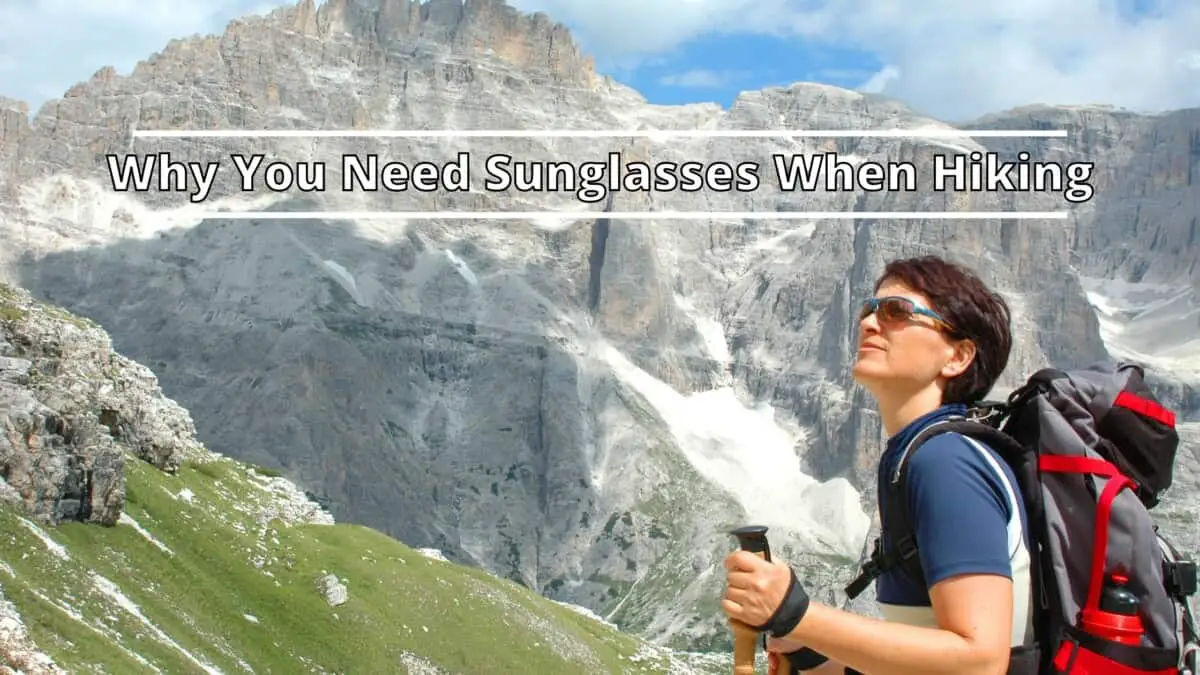When hiking, you will be exposed to bright and sunny weather. Therefore, you will need a pair of sunglasses to protect your eyes. These can prevent eye damages, and let you see properly, thus reducing high contrasts.
You will be needing sunglasses when hiking to protect your eyes from UV rays, and other common illnesses that occur when your eyes are exposed to the sun. Whether you’re using them for your daily routine, or hiking through high mountains, a pair of sunglasses will not only protect your eyes from the glimmer of the sun, but also from the winds and sands.
We still have a lot of topics to discuss aside from what we mentioned. In this article, we will be talking about the reasons why you need a pair of sunglasses when hiking, how UV rays can damage your eyes, and we will be giving tips, and list the best color of lens to use when hiking.
When you venture out into the wilderness for a hike, it’s important to arm yourself with items that will protect you from the elements. One of the items that you should always have with you is a good pair of sunglasses to protect your eyes. If you want to get a pair that is perfect for hiking, check out our best hiking sunglasses recommendations.
UV rays damage your eyes
From our light research, UV rays can damage your eyes if exposed for a long period of time. They can damage the outer areas of your eyes, especially the cornea and conjunctiva. UV rays are also aggravated when the sunlight is reflected onto water, snow, ice, or sand.
Since we mentioned UV rays above, let’s discuss these a bit. UV rays come together with the sunlight. So if sunlight strikes directly onto your eyes, it can result in some injury and harm to your eyes.
There are three levels of UV rays — UVA, UVB, and UVC. If you noticed, they are listed from the most modest, to the most intense degree. But to clarify, no UV rays are just “okay” to hit your eyes, because all of them are dangerous.
-
UVA rays are a common type that is associated with sunlight
These kinds of rays are considered to be the lowest stage. However, don’t be complacent with this type as it can impair your eyes if exposed for a long period of time.
-
UVB rays are at the second level
These are more powerful than UVAs. If you are hiking and the terrain you are traveling on is elevating, it will permit UVBs to affect you. Therefore, the best option to protect your eyes is to use sunglasses with UV protection.
-
The highest degree, and the strongest are UVC rays
There are some sunglasses that don’t have the capacity to protect you from these kinds of rays. Based on our reviews, we noticed that the HULISLEM S1 Sport Polarized Sunglasses can defend you from these.
Benefits of wearing sunglasses while hiking
You really need sunglasses when hiking, as they can protect you from the harmful effects of the sun. They can shield your eyes from dangerous UV rays that can damage your eyes. Wearing sunglasses in sunny weather can also help you see properly, because it can reduce reflection and brightness.
Below are the explanations as to why you need to get a pair of sunglasses before you hike.
-
Protection from the sun
This is the best reason as to why a traveler, camper, or hiker needs a pair of sunglasses. Sunlight causes harmful effects on your eyes; these are the ultraviolet (UV) rays. So, having a pair of sunglasses that provides UV protection will definitely shield your eyes from these rays.
-
They work as a defense from extreme UV rays
When hiking, you will gradually travel upwards. If you are slowly elevating, there is more possibilities that the extreme UV rays will strike. As previously mentioned, there are three types of UV rays — UVA, UVB, and UVC. Most probably, UVB will be your enemy in this type of activity.
-
They prevent reflections
This is where polarized lenses come in handy, as they reduce the reflections from the sun that may pass through the sunglasses. Having tinted and polarized lenses is great since it will protect you from the blinding lights under sunny weather.
-
Prescription sunglasses are available
If you are wearing prescription eyeglasses, then it is recommended for you to consult for a pair of sunglasses that is aligned with your prescription. Sunglasses are made for protection, so they are not graded. Therefore, you really need to ask for some modifications for your safety.
Just like any other equipment, you need to properly take care of your sunglasses to make them last longer. It’s easy to damage your sunglasses by using the wrong cleaning technique or a strong cleaning solution which is why we recommend that you follow our guide to know about the best way to clean and protect your sunglasses.
What happens if you don’t wear sunglasses
Not wearing sunglasses does not only put you at risk from harmful UV rays, but there are also some serious consequences from that. From eye sunburn to eye cancer, there are multiple illnesses that can result from UV rays. This cannot only occur by wearing no sunglasses at all, but also by using cheap sunglasses.
Here are some of the things that might happen to you if you don’t wear sunglasses when hiking:
-
Cataracts
Cataracts are developed when your eyes are excessively exposed to UV rays while they’re unprotected. Cataracts are when you experience blurry vision, light sensitivity, faded color visions, double vision, and difficulty seeing at night.
-
Eye sunburn
Eye sunburns are medically known as photokeratitis. This is a spur snow blindness that’s caused by the reflection of surfaces like water, sand, snow, and ice. Using sunglasses that have UV ray protection can help block these reflections.
-
Crow’s feet
While you’re walking, running, or hiking into the wilderness, there’s no escape from the brightness of the sun. Just by looking into the horizon, you’ll always be squinting to let your eyes rest just for a quick split of a second. Squinting is one of the contributors to why you might develop crow’s feet. By wearing UV-protected sunglasses, you reduce, and sometimes even eliminate the unnecessary squinting that you do.
-
Eye cancer
Wearing sunglasses helps protect your eyes from developing eye cancer, medically known as uveal or intraocular melanoma. Symptoms of eye cancer include dark spots on the iris, seeing flashes of light, having blurry vision, and seeing “floating” spots.
What is the best lens color when hiking?
From our assessments of the different sunglasses, we found out that those with darker tints are a good choice for hiking. Most probably, you will be hiking in sunny weather, so choosing dark-colored lenses will reduce the brightness of your surroundings. The best option is a shade of grey or black.
Different lens colors are available on the market. However, not all of them are recommended for all kinds of outdoor activities. There are colors that can be the cause of interference of your vision.
If you know you’ll be exposed to bright and sunny weather, we advise you to choose lenses with darker tints. The best options are any shades of black or grey. They can lessen the brightness and sharpness of your surroundings, so that you can properly see.
Those with lighter colors and tints are great for moderate weather. But, don’t expect that it can lessen the contrast. They can only protect your eyes.
When choosing a pair of sunglasses, you should also pay attention to the color of the lenses. This is one of the factors that guard your vision when hiking.
Conclusion
If you are planning to hike, be sure to bring complete gears and equipment. You will be dealing with some unexpected things, so you better to be prepared. One of these mandatory gear is a pair of sunglasses. They can protect your eyes and vision, especially in bright situations.
Not only will sunglasses protect your eyes from UV rays, but they will also reduce the contrast of your vision. We really recommend you to choose the perfect pair of sunglasses to accompany you on your adventures.

